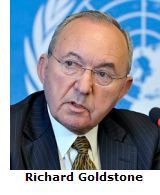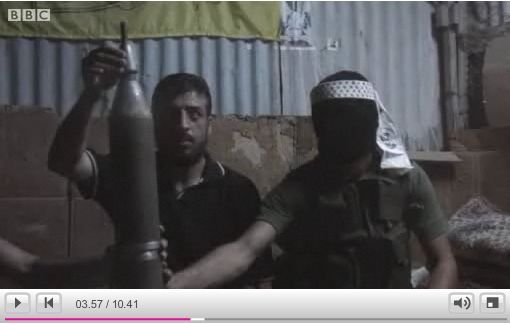 As reported by the New York Times, Israel is preparing to release its own rebuttal to the Goldstone Report, some of the contents of which were released to the newspaper:
As reported by the New York Times, Israel is preparing to release its own rebuttal to the Goldstone Report, some of the contents of which were released to the newspaper:
One concerned the destruction of Gaza’s sole flour mill. The Goldstone report asserts that the Bader flour mill “was hit by an airstrike, possibly by an F-16.” The Israeli investigators say they have photographic proof that this is false, that the mill was accidentally hit by artillery in the course of a firefight with Hamas militiamen.
The dispute is significant since the United Nations report asserts that “the destruction of the mill was carried out for the purpose of denying sustenance to the civilian population,” an explicit war crime.
A second finding concerned the destruction of a wastewater plant, leading to an enormous outflow of raw sewage. The Goldstone report contended that it was hit by a powerful Israeli missile in a strike that was “deliberate and premeditated.” The Israelis say they had nothing to do with that plant’s collapse and suggest that it may have been the result of Hamas explosives.
The two cases, along with the destruction of chicken coops, water wells, a cement plant and some 4,000 homes, are crucial building blocks in the Goldstone case that Israel set out to eliminate infrastructure so as to cause intense civilian suffering.
BBC’s Newsnight filmed a report by British Gulf War veteran Colonel Tim Collins who visited Gaza one year after the end of Operation Cast Lead. The Goldstone Report, amongst other charges, claims that Israel indiscriminately attacked places of worship. Yet, unlike Goldstone, Tim Collins visits one such mosque and concludes that the evidence of secondary explosions could only have been the result of weapons stored inside the mosque itself.
Even a BBC report sees what Goldstone failed to acknowledge – click on the image below to view the entire report.
While we await Israel’s full response to Goldstone, which is to be handed imminently to UN Secretary General Ban Ki-moon, others have also been further analyzing the Goldstone Report’s contents with a fine toothcomb.
 Alan Dershowitz focuses on the two central conclusions reached in the report:
Alan Dershowitz focuses on the two central conclusions reached in the report:
The first is that the real purpose of Operation Cast Lead was not to protect Israeli civilians from Hamas rockets, over eight thousand of which had struck Israel over a nine year period. According to the report, Israel used the rocket attacks on its citizens as a pretext, an excuse, a cover for the real purpose of the operation, which was to target innocent Palestinian civilians – children, women, the elderly – for death. This criminal objective was explicitly decided upon by the highest levels of the Israeli government and military and constitutes a deliberate and willful war crime. The report found these serious charges “to be firmly based in fact” and had “no doubt” of their truth.
In contrast, the Mission decided that Hamas was not guilty of deliberately and willfully using the civilian population as human shields. It found “no evidence” that Hamas fighters “engaged in combat in civilian dress,” “no evidence” that “Palestinian combatants mingled with the civilian population with the intention of shielding themselves from attack,” and no support for the claim that mosques were used to store weapons.
As we will see, the report is demonstrably wrong about both of these critical conclusions. The hard evidence conclusively proves that the exact opposite is true, namely that:
Read Alan Dershowitz’s full essay here (PDF format).
Also offering an analysis of the Goldstone Report is Professor Richard Landes in a two part piece in the Middle East Review of International Affairs (MERIA), which includes an examination of the media’s role in the Gaza conflict:
The role of the media in generating the first draft of the Goldstone Report entered a new stage once the fighting was over. Journalists were then able to enter the area and report a second round of alleged atrocities without noting how, in some cases, these contradicted earlier Palestinian reporting. While some unearthed evidence of Hamas’ brutality, explained off-camera with the most extreme of lethal narratives.
The most incendiary case concerned the January 6, 2009, death of three girls belonging to the Abd Rabbo family. Ma’an News Agency had reported the following day that they died as the result of air strikes. Yet a fortnight later, the story changed into an elaborate tale of gratuitous, cold-blooded murder, in which an Israeli soldier popped out of a tank while his mates munched on oranges and chocolate, and shot the three girls and their grandmother, then the soldiers crushed the ambulance that came to evacuate them, so they bled to death.
This story became headline news around the world, most notably in Tim McGirk’s articles for Time Magazine. Those who argue that coverage might have been more responsible had the Western press been there from the start should note how the work of Bowen, McGirk, and others calls into question that idea.
Read Parts 1 and 2 of this article here.
Meanwhile, Jeffrey Goldberg interviews Elliot Abrams, the key Middle East policymaker on President Bush’s National Security Council:
ltr align=justify>JG: You say that Goldstone treats Israeli self-defense as a war crime. But looking back, do you think Israel made any mistakes in its incursion into Gaza, and do you think that some of Israel’s actions could, in fact, constitute war crimes?
EA: The issue is not whether Israel made any mistakes of policy, strategy, or implementation, nor whether any Israeli soldier violated his instructions. As to the latter, I assume that happens in all armies, and all decent armies, like ours and the IDF, investigate and punish misconduct. But only Israel gets a UN Human Rights Council “report” whose biases and errors should be a source of shame to that Council (though even at its young age it is obviously beyond shame). As to errors of policy regarding Gaza, they absorbed 8,000 rockets and mortars aimed at civilians before they went back in, all the while devoting enormous energy to developing their defenses from such weapons (the “Iron Dome” system) so that they would not need to go in again. Name the country that would take 8,000 attacks against civilians without responding before criticizing Israel for doing so. The question that presents itself, I think, is whether a tougher response earlier on, shortly after leaving Gaza in 2005, would have taught Hamas the lesson it has now apparently learned and led it to stop the attacks on Israel from Gaza.
HonestReporting will be there to provide full coverage of Israel’s official response to the Goldstone Report as soon as it is released.


